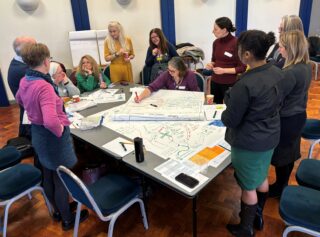Q Exchange
System Improvement Coaching for United Neighbourhoods
- Proposal
- 2024

What is the challenge your project is going to address and how does it connect to the theme of 'How can we improve across system boundaries?
“Please, just ask them to work together” was the simple feedback received from a lady who had 82 medical appointments last year. This was our call to action, to improve the way we support frail people: to join up care and provide this closer to home within our neighbourhoods.
One Gloucestershire Improvement Community enables health and care colleagues to team together across organisational boundaries to address complex challenges in our system. We are committed to building collaborative improvement capability and innovating the practical support teams require as they create transformative ways of working.
A joined-up approach for people with frailty is a top priority. It is a complex syndrome, with 53% of Gloucestershire’s over 65’s presenting with frailty. The International Federation of Integrated Care demonstrates that common purpose and strong working relationships improves people’s health and wellbeing outcomes and our staff experience. System improvement coaching will help us realise these benefits.
What does your project aim to achieve?
Our aim is to develop a local vanguard of highly skilled system improvement coaches, drawn from colleagues with both a wide experience of leading transformation and expert improvement skills. Our system coaches will help cross-organisational health and care teams as they develop their strategic system thinking, select appropriate technical improvement tools and form their relational approach to distributed leadership.
Our focus is to provide system improvement coaching for Integrated Neighbourhood Teams as they develop new ways of working to deliver great proactive care for people with severe frailty. We will work with three neighbourhoods in the first phase, enabling them to reach their goals of improving people’s quality of life, delaying health deterioration, and reducing health crises requiring hospital admission.
As well as enabling successful transformational change it will be the role of our coaches to leave a positive legacy with the cross-organisational teams, as they embed on-going continuous improvement.
How will the project be delivered?
Over the last year we have partnered with RubisQI to develop a new System Improvement Coaching programme. So far, we have produced the content and are now delivering a test cohort with senior leaders from across health and social care.
Our next level plan is to deliver a full second cohort of the system improvement coaching programme for up to twelve participants commencing in September 2024, who will then support neighbourhoods over the following year.
An Improvement Collaborative is being formed with three neighbourhoods with contrasting communities. We have strategic ICS support, a design group with wide-ranging expertise, and have engaged extensively with prospective neighbourhood partners.
Our Improvement Community Steering Group will provide collective guidance to the project’s delivery. We also look forward to working as a pilot site for the Health Foundation’s new framework for improving across health and care systems, and this project will inform our wider development.
How is your project going to share learning?
Dissemination of learning to the fifteen neighbourhood areas in Gloucestershire is our key priority, through our design group and Improvement collaborative. We will also share our development journey through regional and national forums, including the International Federation for Integrated Care.
The System Improvement Coaching programme has wider strategic intent, with an ambition to enable a wide portfolio of complex system improvement priorities. We aim for our cadre of highly skilled coaches to support ongoing assignments and give leadership within our local system improvement community of practice.
Members of the project team are joining the Health Foundation/NHS Confederations System Improvement Peer Learning Programme, and we will use this forum to share our experiences and gain valuable feedback. We plan to publish an account on our preliminary learning in the forthcoming months, and to organise a webinar to share our learning with Q Community colleagues.
How you can contribute
- We would appreciate connecting with other Q members with an interest in building System Improvement capability, We would like to hear from colleagues that have convened improvement collaboratives in place-based settings, and have experience at cross-system neighbourhood working. We would also be interested in sharing experiences of mapping improvement capability and capacity at system-level.
Plan timeline
| 7 Jul 2024 | Recruit Coaching Programme Participants |
|---|---|
| 4 Aug 2024 | Complete Update and Review of Programme Contents |
| 19 Aug 2024 | Liaise with three Neighbourhoods on Improvement Plans |
| 22 Sep 2024 | Commence System Coaching Programme |
| 13 Oct 2024 | Assign participant to neighbourhood teams |
| 7 Nov 2024 | Agree coaching contacts and/or co-coaching with programme leads |
| 15 Dec 2024 | Complete taught phase of System Improvement Coaching |
| 12 Jan 2025 | Commence peer supervision |
| 26 Jan 2025 | On going coaching sessions agreed with Neighbourhood teams |
| 9 Mar 2025 | Mid-point review session |
| 2 Jun 2025 | Collation of findings for year 1 report |
Comments
Nathalie Delaney 7 Mar 2024
This looks like a great project and builds on the brilliant improvement community activity in the area. I look forward to hearing more and do let me know if I can help in any way!
Sid Beech 28 Feb 2024
This sounds extremely exciting! Would love to be involved in some way - even just to be kept in the loop on the systems coaching programme.
Kathryn Hall 4 Mar 2024
Hi Sid, yes, we're really excited too! We're keen to support the collaborative development of our INTs and to embed improvement into their future work together. So, it would be great to catch-up sometime and discuss how we could link up. Many thanks Kathryn
Comments are now closed for this post.